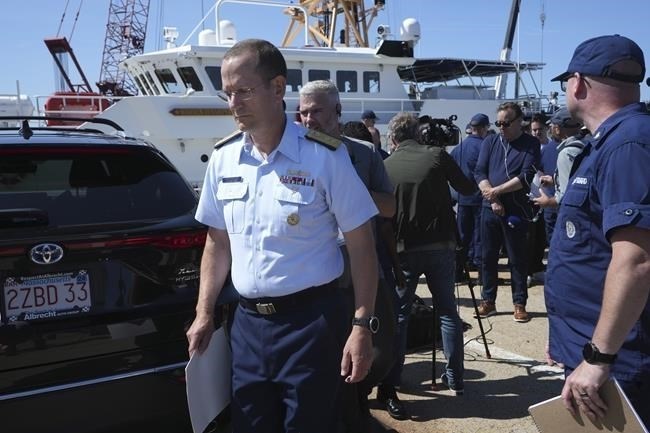
U.S. Coast Guard Rear Adm. John Mauger, commander of the First Coast Guard District, left, steps away from the media at the conclusion of a news conference, Thursday, June 22, 2023, at Coast Guard Base Boston in Boston. The U.S. Navy has confirmed its acoustic sensors detected “an anomaly consistent with an implosion” in the area where the doomed submersible Titan was operating when it lost contact with surface vessels on Sunday.
Image Credit: THE CANADIAN PRESS/AP/Steven Senne
June 23, 2023 - 7:30 AM
DARTMOUTH - The U.S. Coast Guard will lead an investigation into the catastrophic implosion of the Titan submersible, which broke apart with five aboard and sank to the ocean floor during a dive to the Titanic earlier this week.
All five passengers and crew were presumed dead Thursday soon after a crew guiding a remotely operated vehicle spotted the Titan's wreckage about 500 metres from the Titanic's bow, almost four kilometres below the surface of the North Atlantic.
The U.S. National Transportation Safety Board issued a statement Friday saying the U.S. Coast Guard had declared the loss of Titan a "major marine casualty" and, as a result, would lead the investigation.
Peter Knudson, a spokesman for the board, said the NTSB had joined the investigation.
As of Friday, it remained unclear what role Canadian authorities would play.
Since the beginning of the search late Sunday, the U.S. Coast Guard has repeatedly referred to Titan as a Canadian vessel, though the company that operated the small craft, OceanGate Expeditions, is based in the United States.
Marc Isaacs, a maritime lawyer in Toronto, said the independent Transportation Safety Board of Canada could also claim jurisdiction over an investigation, given that Titan's mother ship, the Polar Prince, is registered under the Canadian flag.
The ship, a former Canadian Coast Guard vessel, is owned by the Miawpukek First Nation in southern Newfoundland.
Isaacs said the Canadian and American safety board will likely work together. “I doubt two organizations like that are going to get into a turf war about who leads an investigation.”
The Transportation Safety Board of Canada did not respond to a request for comment Friday.
Meanwhile, the U.S. navy confirmed Thursday its acoustic sensors detected “an anomaly consistent with an implosion” in the deep area of the ocean where the doomed submersible was operating Sunday, several hours before it was reported missing.
In an email, a senior U.S. navy official said an analysis of the acoustic data was shared with the “unified command” leading the search.
The U.S. navy has long maintained a network of listening devices on the floor of the North Atlantic to detect hostile submarines.
The navy official said the finding was not definitive, adding that the information was considered with acoustic data provided by other partners in the search for the Titan, which was led by the U.S. Coast Guard. The official said the decision was made to continue with the search-and-rescue mission and “make every effort to save the lives on board.”
But information about the anomaly wasn’t shared with the public until after the Titan’s wreckage was found and all five aboard were presumed dead.
The Canadian Armed Forces, which took part in the search, did not immediately respond to a request for comment about the U.S. navy's data.
OceanGate, based in Everett, Wash., continues to face intense scrutiny over its safety practices.
Marine engineers have drawn attention to the fact that Titan, which had a carbon-fibre hull, was never "classed" or certified by an independent third party to ensure it met certain safety standards. In 2018, a group of engineers wrote a letter that warned that the company’s “experimental” approach could have “catastrophic” consequences.
In response, OceanGate explained on its website that Titan was not classed because the process could inhibit innovation.
In Halifax, a Canadian military official confirmed Friday that the Canadian Coast Guard vessel John Cabot would remain in the search area to help with the recovery operation, though no details were released.
The U.S. Coast Guard has yet to say whether any of the fractured pieces of the sunken submersible would be retrieved from the ocean floor.
Some of the other Canadian ships and aircraft used during the search were sent back to their bases Friday, including coastal defence vessel HMCS Glace Bay, based in Halifax, and a CP-140 Aurora long-range patrol aircraft, based at CFB Greenwood in western Nova Scotia.
"The U.S. coast guard no longer requires the rescue assets from our forces," said Lt.-Cmdr. Len Hickey, spokesman for Joint Rescue Co-ordination Centre in Halifax.
Earlier this week, the crew aboard an Aurora aircraft dropped sonar-equipped buoys into the ocean near the Titanic wreck site and picked up banging sounds, which led to frenzied speculation that those aboard the Titan could have been signalling for help.
On Thursday, the U.S. Coast Guard said those noises had no connection to the demise of Titan.
This report by The Canadian Press was first published June 23, 2023.
News from © The Canadian Press, 2023